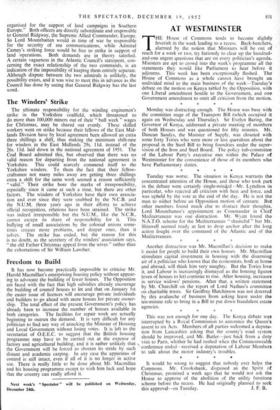AT WESTMINSTER
THE House of Commons tends to become slightly feverish in the week leading to a recess. Back-benchers, alarmed by the notion that Ministers will be out of reach for a week or two, try furiously to clear up the hundred- and-one urgent questions that are on every politician's agenda. Ministers are apt to crowd into the week's programme all the statements they would like Parliament to hear before it adjourns. This week has been exceptionally flushed. The House of Commons as a whole cannot have brought an undivided mind to the main business of the week—Tuesday's debate on the motion on Kenya tabled by the Opposition, with one Liberal amendment hostile to the Government, and one Government amendment to omit all criticism from the motion.
*
Monday was distracting enough. The House was busy with the committee stage of the Transport Bill (which occupied it again on Wednesday and Thursday). Sir Evelyn Baring, the Governor of Kenya, addressed a private meeting of members of both Houses and was questioned for fifty minutes. Mr. Duncan Sandys, the Minister of Supply, was closeted with some forty Tories who were more or less querulous about the proposal in the Steel Bill to bring foundries under the super- vision of the Iron and Steel Board. The policy sub-committee of the Labour Party's executive met within the Palace of Westminster for the convenience of those of its members who have Parliamentary duties. ,
* * * *
Tuesday was worse. The situation in Kenya warrants the concentrated attention of the House, and those who took part in the debate were certainly single-mindFcl--Mr. Lyttelton in particular, who rejected all criticism with heat and force, and was upheld by the vote at the end of the day. He is not the man to wither before an Opposition motion of censure. But other members found much else to distract their thoughts. Lord Mountbatten's appointment as Commander in Chief Mediterranean was one distraction. Mr. Wyatt found the N.A.T.O. scheme for the Mediterranean " shameful " but Mr. Shinwell seemed ready at last to drop anchor after the long action fought over the command of the Atlantic and of the Mediterranean.
* * * *
Another distraction was Mr. Macmillan's decision to make it easier for people to build their own houses. Mr. Macmillan stimulates capital investment in housing with the disarming air of a politician who knows that the economists, both at home and abroad, will think him very naughty. But the Tories love it, and Labour is increasingly dismayed as the housing figures (even of houses to let) continue to rise. After housing, increases in service widows' pensions. After that, a written statement by Mr. Churchill on the report of Lord Nathan's committee on charitable trusts. Sir Geoffrey Hutchinson was not deterred by this avalanche of business from asking leave under the ten-minute rule to bring in a Bill to put down fraudulent estate agencies.
This was not enough for one day. The Kenya debate was interrupted by a Royal Commission to announce the Queen's assent to six Acts. Members of all parties welcomed a deputa- tion from Lancashire asking that the county's road system should be improved, and Mr. Butler—just back from a duty visit to Paris, whither he had rushed when the Commonwealth conference ended—received a deputation of Labour Members to talk about the motor industry's troubles.
* * * *
It would be wrong to suggest that nobody ever helps the Commons. Mr. Crookshank, disguised as the Spirit of Christmas, promised a week ago that he would not ask the House to approve of the abolition of the utility furniture scheme before the recess. He had originally planned to seek


































 Previous page
Previous page